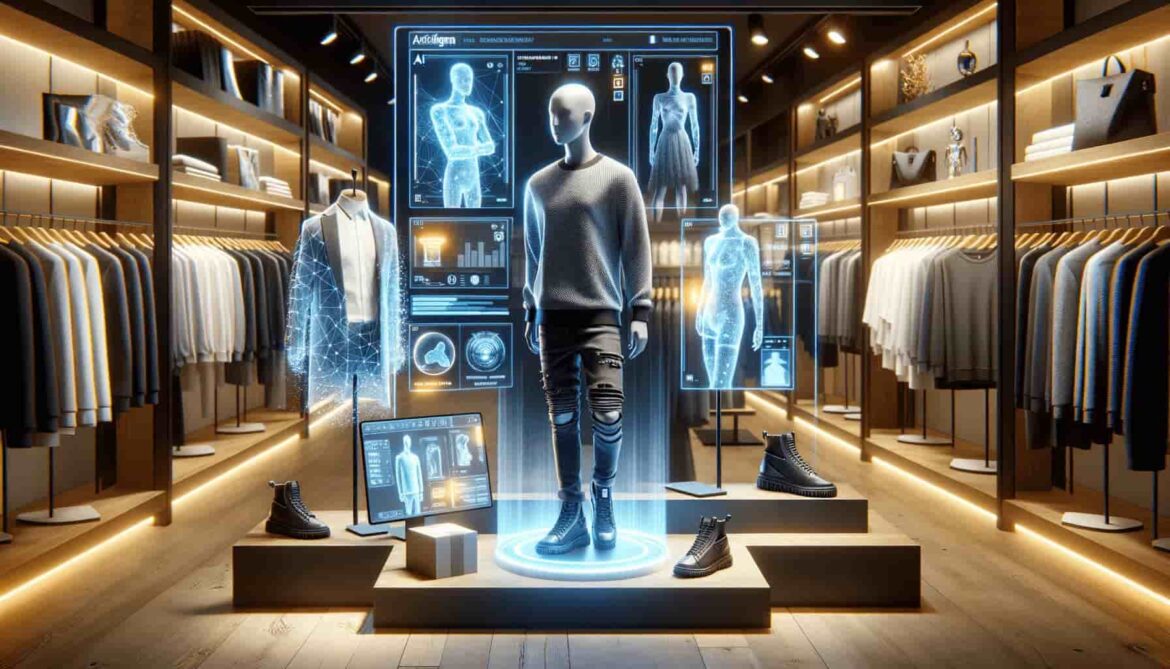The emergence of Artificial Intelligence in the fashion industry
Initially perceived as a futuristic and complex concept, artificial intelligence (AI) has gradually been integrated into various industries, including fashion. Clothing brands, constantly on the lookout for innovations to set themselves apart, are increasingly adopting this technology to rethink the creation and distribution of their products. AI’s influence can be seen at every stage, from design to sales, transforming traditional processes into optimized, intelligent routines.
AI and clothing design
One of the main areas where AI is making its mark is fashion design. Machine learning algorithms help designers explore new shapes, textures and color combinations, generating innovative proposals. These AI tools draw on data such as emerging trends, customer feedback and even weather conditions to create designs that meet consumer expectations while reducing the risk of unsold productions.
AI in production and the supply chain
Integrating AI into production and distribution processes brings significant improvements in efficiency and cost reduction. Intelligent automation streamlines manufacturing operations. AI-assisted robots are able to sew and assemble parts with unrivalled precision and speed. At the same time, AI-powered supply chain management systems forecast peak demand to optimize inventories and reduce waste.
How AI is redefining the customer experience for clothing brands
Virtual fitting and personalized recommendations
Artificial intelligence has spawned revolutionary tools that are changing the way customers interact with clothing brands. Virtual fitting rooms, for example, allow customers to try on clothes without physically wearing them, thanks to augmented reality. In addition, personalized recommendation systems analyze purchase histories and preferences to suggest items suited to each individual, thus intensifying the online shopping experience.
Customer relations and intelligent chatbots
Artificial intelligence chatbots are renewing the interaction between brands and consumers. These virtual assistants offer 24/7 assistance, managing customer queries with a continuous learning capacity. They facilitate after-sales service, guide purchasing decisions and provide instant responses to customers, leading to increased satisfaction and loyalty.
The challenges of AI for clothing brands
Data protection and privacy
As AI feeds on data to optimize services, the privacy issues are considerable. Wearable brands need to ensure that customer data is secure and used ethically. Compliance with regulations, such as RGPD in Europe, is a key point in the relationship of trust to be established with customers.
Ethical impacts and sustainability
The use of AI also raises ethical concerns, particularly with regard to its impact on employment. Automation can lead to a reduction in jobs in certain manual operations. In addition, fashion brands are increasingly called upon to consider the sustainability of their products. AI can help create more sustainable models, but its development and use must themselves be conducted responsibly.
Outstanding AI innovations applied to fashion
Inspiring use cases
The fashion industry is full of examples of the successful application of AI. Some designers have collaborated with AI engineers to produce collections that adapt to customers’ body variations in real time. Other brands are using AI to predict trends, relying on social network data analysis to anticipate what consumers will want to wear for the next season.
Startups revolutionizing the industry
Numerous startups are playing a leading role in the AI-driven transformation of fashion. They are developing solutions ranging from inventory optimization to upcycling platforms thanks to artificial intelligence. These young companies bring a breath of innovation needed to redraw the contours of a sector often criticized for its lack of sustainability.
The future of fashion with Artificial Intelligence
Forecasts and emerging trends
The potential of AI in fashion is far from exhausted. In the future, we could see the emergence of fully autonomous design modes, where artificial intelligence not only creates designs, but also dynamically manages the supply chain to adapt to changes in demand. Advances in smart materials and the Internet of Things (IoT) could transform garments themselves into interactive, personalized devices.
Is artificial intelligence the future of fashion?
AI is well on its way to becoming a central pillar of the fashion industry. By facilitating the development of garments that better match consumer needs, making brands more responsive and creating memorable customer experiences, AI is helping to shape a future where fashion and technology move forward hand in hand. However, this future will need to be built on solid ethical foundations, ensuring that sustainability and privacy are promoted to guarantee the long-term acceptance and success of these innovations.

